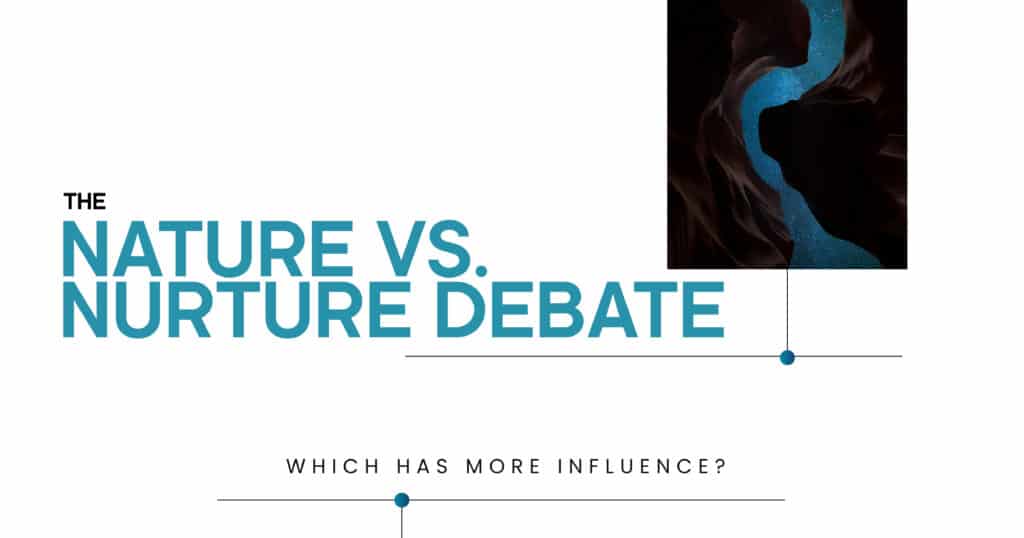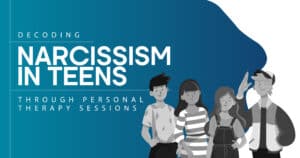For hundreds of years, people interested in science, psychology, and philosophy have been fascinated by the nature vs. nurture debate. Whether specific characteristics are predisposed at birth or acquired about one’s environment is pivotal in understanding the human psyche and in educating and providing mental health services.
While some believe that everything, from one’s intellect to their personality, is predestined by genetics, others argue that “the environment is the dominant factor.” Regardless of which side of the debate one chooses to stand on, most contemporary research appears to settle on the idea that both nature and nurture work in tandem to influence human behavior and development.
What Is the Nature Vs. Nurture Debate?
Within the nature vs. nurture debate, a person’s traits are from their genes or environment. The nature side defends that biological inheritance heavily determines a person’s capabilities, intelligence, and even mental well-being in some cases.
On the flip side, proponents of the nurture argument argue that the experiences one goes through in life, along with one’s upbringing, education, and social interactions, are far more impactful.
This discussion has engaged academics for centuries. Some believe that intelligence is mainly passed down from one’s ancestors, while others argue that it stems from learning and environment.
California Mental Health
What Does Nature Refer to in the Nature Vs. Nurture Debate?
Nature is concerned with every biological and genetic factor that affects a human being and their behavior. This includes attributive characteristics like height, eyes, athletic ability, mental capabilities, various personality types, and the probability of certain psychological disorders manifesting.
The Role of Genetics in Intelligence and Personality
A number of studies indicate that there is a strong hereditary factor when it comes to measuring an individual’s intelligence. For example, twin studies show that identical twins brought up separately tend to have similar IQs, which clearly shows the importance of nature. It is also accepted that traits such as introversion and extroversion are believed to be functional, as some people are sociable while others are not.
Genetic Contributions to Mental Health
That said, the existence of genetic influences does not guarantee that a person will develop a disorder, and this is where nurture begins to take effect.
What Does Nurture Refer to in the Nature Vs. Nurture Debate?
Nurture includes factors from the surrounding environment that impact an individual’s growth. This includes one’s parenting style, level of education, culture, friends, and other experiences. A child’s upbringing, available opportunities, and challenges mold their intelligence, personality, and psychological health.
Impact of Environment on Cognitive and Emotional Development
Kids who receive assistance and learning tools from their caregivers or educators tend to have extraordinary cognitive abilities accompanied by higher self-confidence.
In contrast, children who are neglected or experience trauma during their childhood often struggle with controlling their emotions and engaging with society.
All of these things point towards the fact that even though we might have a mapping strategy, nature does give consideration, but humanity and what we experience in reality make a great deal of difference.
Nurture’s Influence on Language and Skill Development
One consideration of nurture is illustrated with language acquisition. Children can learn languages, but the surrounding environment dictates the specific language they speak. Likewise, a child’s possible athletic skill may stem from genetic factors, but without training and constant practice, they may never achieve their maximum potential.
The Difference Between Nature and Nurture
The distinction between nature and nurture revolves around whether characteristics are inherited or learned. Nature entails hereditary factors, which include physical characteristics, mental capabilities, and the likelihood of certain psychological disorders. Nurture relates to the impact of experience and social interaction on an individual’s growth and development.
While nature provides the foundation, nurture determines how that foundation is built upon. A child may inherit high intelligence, but they may not reach their full potential without a strong education. Similarly, someone with a genetic predisposition for anxiety may never develop the condition if they grow up in a low-stress environment.
Nature Vs. Nurture in Child Development
Parents have a tough job when dealing with children. The genetic traits children are born with are complemented by the environmental influences in which they will be raised and brought up. Each part will have its impact, which makes the nature vs. nurture debate important.
How Genetics Influence Personality and Intelligence
Research on twins provides strong evidence of the effect of genetics on a person’s personality and intelligence. Identical twins brought up in different settings still showcase some similarities in IQ, temperament, and other interests. Some individuals are more sociable, creative, or analytical, all of which can be attributed to their genes.
The distinction has mainly focused on intelligence. Studies show that IQ is closely connected to genetics, with inherited characteristics explaining 50-80% of the differences in IQ.
Nevertheless, intelligence has its boundaries. A child with good genetic potential for intelligence but who lacks good learning environments, interactive experiences, and quality education may never excel academically.
The Role of Environment in Shaping Behavior
Although genetics determines certain aspects of a person, the environment influences traits, conduct, and capabilities to a greater extent. Parents have the most significant impact on a child. Supportive parents encourage the child to develop, while neglectful or abusive parents can create environments prone to emotional and behavioral problems.
Education and culture are also of great importance. Children who grow up with readily available resources such as books, art, and other tools are far more likely to be intellectually and creatively inclined than those who endure stressful and unstable environments.
California Mental Health
Common Nature Vs. Nurture Examples
Numerous real-life nature vs. nurture cases present the elaborate mixture of genetics and the environment. Language learning is one of the most prominent examples. Children have the innate capacity to learn a language, but their language solely depends on the environment.
Nature and Nurture in Athletic Ability
Someone might be born with an innate ability to run or swim because of their muscle composition, but they will not unlock their full potential without practice. Athletic Ability best showcases this example.
The Role of Nature and Nurture in Mental Health
The onset of mental health disorders exemplifies both biological and environmental factors. Take, for example, someone who has a family history of anxiety. The person is indeed predisposed to having anxiety, but whether they develop it will depend on other factors like their level of stress, experiences of trauma, and surroundings.
Nature Vs. Nurture in Mental Health and Behavior
The intersection of nature vs nurture child development, as it relates to mental health, is quite complex. Some mental illnesses, such as schizophrenia and bipolar disorder, have a strong heritable component, which means that people with relatives who have these disorders are likely to acquire the illness themselves. Nevertheless, these disorders often require some form of external stimulus or trigger to worsen the condition.
For example, children brought up in loving, caring households are less likely to develop symptoms of depression, even when their biology suggests they should. Conversely, persistent stress, trauma, and neglect can induce anxiety and depression in individuals who may not have a strong genetic tendency for such mental health issues.
How CA Mental Health Can Help With Psychological and Behavioral Development
At CA Mental Health, we understand how genetics and surroundings impact someone’s mental wellness. We provide tailored therapy and counseling services to assist individuals in addressing and overcoming deep-seated psychological and behavioral issues. Be it because of family-related mental health problems or even due to other situational stressors, our professionals offer specialized care to all patients. Contact us today to learn more.
California Mental Health
FAQs
What are some examples of nature versus nurture?
Such phenomena include acquiring a particular language, athletic prowess, cognitive skills, and even mental disorders, which are all caused by a person’s genes as well as their surroundings.
What is an example of a nurture behavior?
These behaviors can be shaped by the environment, which can nurture a child’s mastery of a new language, cultivate empathy, or assist them in assimilating to cultural practices.
What is nature vs. nurture in child development?
It pertains to integrating genetics with the environment to develop a child’s intellect and individuality.
What Is the difference between nature and nurture?
Nature is genetic, nurture is environmental. Genetics establishes characteristics, whereas one’s environment, through one’s experiences, guides development. Both affect actions.
What is the nature of child development?
Child development is defined as the change and growth in a child’s physical, mental, and emotional characteristics in synchrony with the child’s age. It is influenced by an individual’s genetics (nature) and surroundings (nurture). While nurture fulfills the potential set by nature, nature sets the foundation for an individual’s life.







